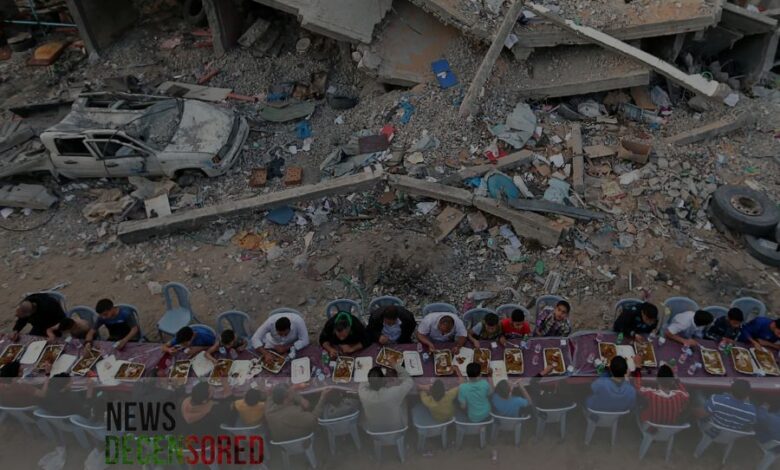What Ramadan looked like a few years back in Gaza

The holy month of Ramadan has begun. Muslims around the world fast, spend time with their families and devote themselves to prayer and worship. But for Muslims in Gaza, this holy month is full of
heartbreak and mourning.
For more than five months, they have been suffering from massacres, disease, famine, and thirst at the hands of the Israeli army. Its violence and brutality did not stop or decline with the beginning of the month of Ramadan.
While many struggle to put food on the iftar table or find a safe place to pray, memories of Ramadan past keep them warm. Amid the roar of Israeli planes and the sounds of explosions, Salah a teenager from
Rafah camp closes her eyes and remembers the splendor of Ramadan in Gaza.
Preparations for the holy month always start early, she says. Several weeks before Ramadan, people would go out shopping to buy all Ramadan supplies.
My favorite place to go is the Old Town and the traditional corner market. There you will find all the traditional Ramadan foodstuffs: sour pickles, the best dates, delicious olives, spices that fill the air with their aroma, thyme, dried apricot paste for making Qamar al- Din drinks, dried fruits, and various types of juices, the most famous of which is carob.
New clothes will also be a necessary purchase. Prayer dresses will be a popular choice, as will fancy dresses for girls and elegant outfits for boys.
The children would pull their parent’s hands and ask them to buy one of the colorful lanterns on display that read “Dear, dear, Ramadan Kareem, dear”.
The streets were filled with people, decorations were up, and cheerful Ramadan songs were playing. The atmosphere of anticipation will be unparalleled.
Then, on the eve of the first day of Ramadan, Gaza’s neighborhoods are filled with the sounds of Tarawih prayers. Children were out until late, playing in the streets, carrying lanterns, chanting, singing, and
setting off fireworks to mark the beginning of the holy month.
Families would gather together to eat the suhoor meal and pray dawn together. Then some may take a nap, others go out to school and work. By the afternoon, everyone will return to their homes, and it will be time to read the Holy Quran. Children read and memorize verses at home or in mosques. Fathers and grandfathers used to tell the stories of the Prophets to their children and grandchildren.
Then it’s time to prepare food for Iftar. In the hour before sunset, the entire neighborhood is filled with the delicious aroma of various foods. The kitchen in each house will be full of hard-working people:
one preparing maqluba (a meat dish with rice and vegetables), another – musakhan (chicken dish), and yet another – molokhiya (jute soup).
Meanwhile, a neighbor might come over and bring a plate full of food his family has just prepared; Naturally, he would not be allowed to return home empty-handed.
As the sun approaches sunset, the Iftar table is set and everyone sits down. Soon the call to break the fast comes from the mosques to the tune of takbirat. Everyone will share delicious food, talk happily, and laugh.
After breaking the fast, men, women, and children head to the mosques to perform Tarawih prayers together, and the sounds of the Holy Quran and supplications permeate all parts of Gaza. Then comes the happiest time of the day for the children, as mothers prepare qatayef, a popular dessert made only during the holy month.
For Gazans, Ramadan is already the most special time of the year. Gaza in the month of Ramadan is the most beautiful place on earth.
But in this holy month, we cannot celebrate and enjoy worship in peace. Lights, colorful lanterns, chants and songs were replaced by flashes and sounds of Israeli bomb explosions. The noise of children playing in the streets outside has been replaced by the cries of people buried under the rubble after another Israeli bombing.
Neighborhoods full of life have turned into cemeteries. The mosques are not crowded with people because they are all destroyed. The streets are not crowded with people, because they are all covered in
rubble. People fast again after breaking the fast because they have no food or water.
Families come together not to greet each other and celebrate, but to mourn together the dead. With the beginning of the holy month of Ramadan, we bid farewell to one martyr after another.
The pain is made worse by the realization that the world has abandoned the Palestinian people, allowing Israel to continue its genocide during the holy month of Ramadan.




